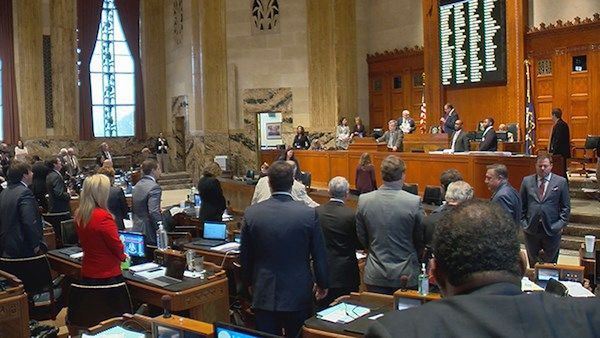Jim Beam column:Session ended in controversy
Published 6:49 am Saturday, June 10, 2023

- Louisiana legislators. (Photo courtesy of WVUE-Fox 8).
One of the most hectic 30 minutes in recent legislative history occurred Thursday as the House speaker rushed financial bills to final action with little or no discussion just prior to final adjournment.
Rep. Blake Miguez, R-New Iberia, who also chairs the House Republican Delegation, spoke for some of the most conservative lawmakers in the House when he told the speaker, “I know you’re hearing them. Why are you not calling on them? … Are you breaking the House rules?”
The Advocate said, “Meanwhile, Speaker Clay Schexnayder, R-Gonzales, barreled ahead to quickly vote on the bills without debate. The conservatives yelled at Schexnayder numerous times, demanding that he explain what was in the budget bills.”
Then, Rep. Danny McCormick, R-Oil City, chimed in, “This meeting is unconstitutional! This is shameful!”
When the vote was called on House Bill 1, the state budget bill, it passed 95-9. Reps. Brett Geymann, R-Moss Bluff; Rodney Schamerhorn, R-Hornbeck; and Phillip Tarver, R-Lake Charles, were among the 9 votes against. Those 9 votes were cast by some of the most conservative members of the House who opposed four other financial measures.
Conservatives in the House were also opposed to raising the state’s expenditure limit in order to use $2.2 billion in surpluses for infrastructure work, higher education maintenance and other long-term state needs. They lost that battle, too, when the House voted 85-19 to raise the spending limit.
Paying off retirement debt was their main goal, which didn’t require raising the cap. However, they still won a major victory when the budget bill that 9 of them opposed contained the payment of $691 million in retirement debt.
When the session ended at 6 p.m. Thursday, there were two major problems that surprised many legislators. The budget contained a $100 million reduction to the Louisiana Department of Health and teacher pay raises weren’t guaranteed for more than one year.
The Illuminator reported that Gov. John Bel Edwards and several senators said they were blindsided by the health care change that could cost the state as much as $400 million in federal matching dollars. Edwards said he would try to lessen the impact but didn’t explain how he might do it.
A $2,000 annual pay increase for teachers and $1,000 for school support workers isn’t in the Minimum Foundation Program (MFP) that funds K-12 public education so it is now just a one-time supplement. The MFP wasn’t approved, and the current formula stays in effect.
The raise will only become permanent if the next governor and Legislature make increases part of the MFP. Why that wasn’t done at this session is still puzzling. Legislators want credit for a permanent teacher and support worker pay increase.
Waiting until the last minute to finish important work is not unusual at most sessions. However, the wild and wooly end of this one may have happened because lawmakers believed it would be their last one for the current four-year term.
However, Edwards expressed plans after the session that might create a veto session. The governor said he plans to veto three bills that target LGBTQ+ people. The legislation approved by both Republican-controlled chambers seeks to curtail discussion of LGBTQ+ identity and health care received by transgender people.
Another session could be necessary to draw new congressional maps that create a second majority-Black district. The U.S. Supreme Court has ruled in favor of Black voters in a similar Alabama case. How that issue might be settled is still unknown.
Juveniles were targeted in two bills. The failure of one of them is a positive move. It would have made youth court records public in Caddo, East Baton Rouge, and Orleans, three majority-Black parishes. Critics called it racist, and the bill died in the Senate Finance Committee.
A bill that passed is a poor decision because it kills a criminal reform measure enacted in 2016 that phased 17-year-old offenders into the state’s juvenile justice system. Those charged with nonviolent crimes entered the juvenile justice system July 1, 2018. Offenders charged with more serious crimes joined the juvenile system two years later.
Sheriffs in some parishes are complaining about not having any place to keep 17-year-olds in custody, so the bill that passed will allow sheriffs to hold those charged with serious crimes in adult jails. That is where they face sexual abuse and solitary confinement that can lead to trauma and possible suicide.
Members of the Legislature deserve a passing grade on financial matters they handled at the recent session. However, they flunked badly on how they dealt with social issues.





